Home > Articles > Special Series > Bill Emerson Joins the US Navy
Bill Emerson Joins the US Navy
By the end of 1972, the Country Gentlemen—with Charlie Waller, Bill Emerson, Doyle Lawson, and Bill Yates—had become the most popular band in bluegrass music. However, in early 1973 the US Navy proposed to Bill Emerson an offer that he could not refuse and he left the Country Gentlemen to join the Navy and become the director of the Navy’s new country band Country Current.
The Navy Band
The modern US Navy band program was initiated in 1925 to “serve the ceremonial needs at the seat of government,” performing at presidential inaugurations, state arrival ceremonies, state funerals, state dinners, and other significant events. In 1945 the Navy added the Navy Band Symphony Orchestra and in 1956 the Navy Sea Chanters chorus was also added to the Navy Band program.
In 1968 Cmdr. Donald Stauffer became the fourth leader of the Navy band. During the late 1960s, there was a growing hostility towards the military due to the conflict in Vietnam. The desire for the Navy to appeal to young people—for recruiting purposes—led to the formation of the Commodores jazz ensemble in 1969, the Port Authority rock band in 1970, and the Country Current country band in 1972.
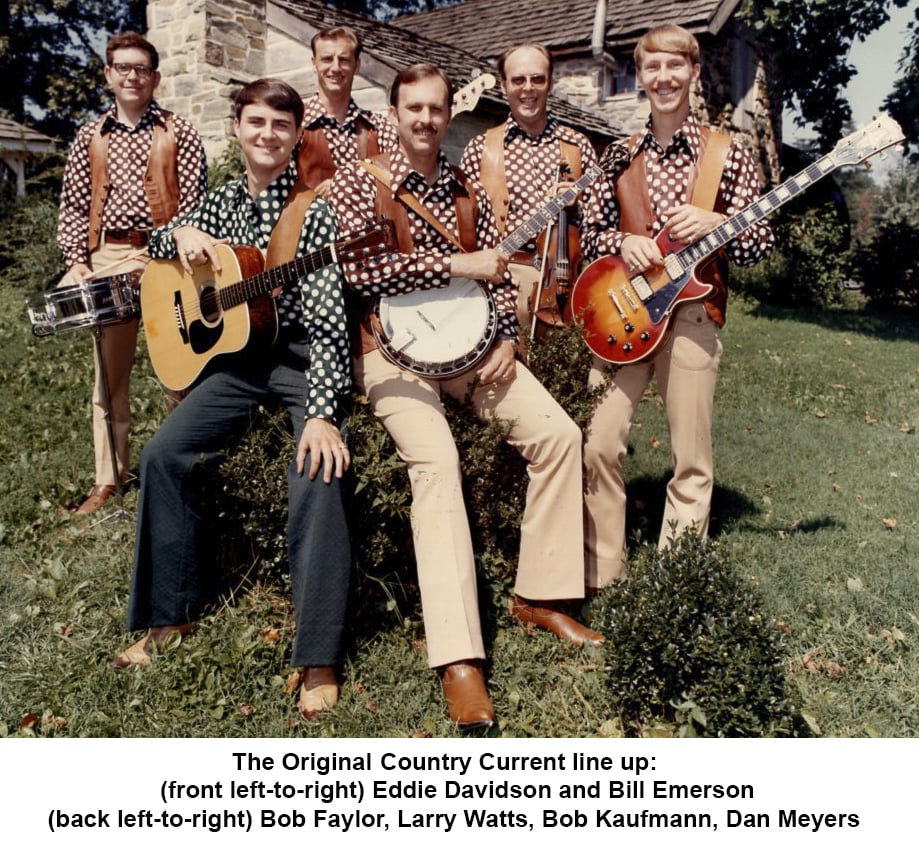
The first member of the country band, which was originally called The Country Tide, was guitar player and singer Eddie Davidson. In a phone interview in December of 2021, Davidson told the story behind the formation of the Navy’s country band. In 1972, Davidson was an eighteen-year-old senior in high school living in Lake Ozark, Missouri. He was also a guitar player and singer who performed at the Lodge of the Four Seasons in Lake Ozark. The entertainment director at the lodge was former National Symphony orchestra percussionist Jack Dennett.
In early 1972, Davidson, still in high school, joined the Navy under the military’s new early enlistment program, intending to be a Navy corpsman. When Dennett heard about Davidson’s enlistment, he called his old friend Cmdr. Donald Stauffer, who he had known when he worked for the National Symphony. After the Navy had formed the rock band in 1970, Dennett had recommended to Stauffer that the Navy also form a country band in order to appeal to high school kids in rural America who were country music fans.
When Davidson expressed interest in joining the Navy, Dennett called Stauffer and recommended Davidson as a candidate, should the Navy decide to form a country band. Stauffer flew Davidson to Washington, D.C. for an audition. Davidson said, “It was the first time I’d ever been on an airplane. I got there and played ‘Folsom Prison Blues’ and ‘Roll In My Sweet Baby’s Arms’ and they said ‘You’re hired.’ I think that they were looking for a young person who kids in high school could relate to.”
Davidson went off to boot camp and, upon completion, instead of going off to learn how to be a corpsman, he was immediately promoted from E-1 (Seaman Recruit) to E-5 (Petty Officer Second Class) and sent to Washington, D.C. to become the first member of the Navy country band Country Tide. Davidson said, “They sent me to play a show at the Officer’s Club at the Patuxent River Air Station. I played the show by myself and afterward they said, ‘We need to get you a band.’” The Navy brought in Bob Faylor on drums and Larry Watts on bass (who had been in the Navy jazz band since 1969) to back up Davidson on guitar and lead vocals. The group first performed as a trio for a short time and then Bob Kaufmann joined them on fiddle. Their first tour covered the upper Midwest and Texas. Early on, the band’s name was changed from Country Tide to Country Current. Davidson said, “I think Country Tide sounded too much like a detergent.”
Bill Emerson Joins the Navy
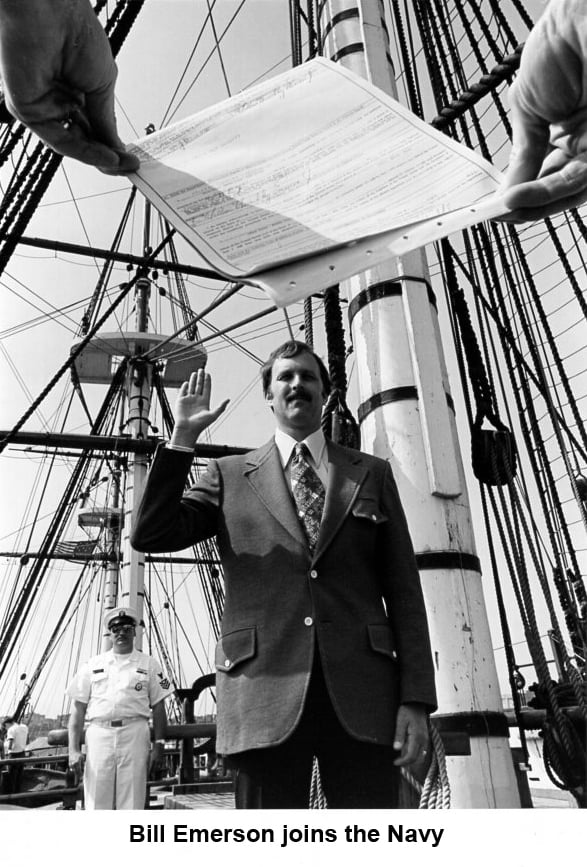
In early February 1973 the Country Gentlemen performed at Constitution Hall in Washington, D.C. with the United States Navy symphony orchestra— under the direction of Cmdr. Donald Stauffer—and Country Current. Davidson remembers that the publicist for the Navy band, George Brooks, came up with the idea. Since bluegrass was popular in Washington, D.C. and the Navy had a new country band—and the publicist’s wife worked at Constitution Hall and could help book the venue—he felt the show would be a big success. The orchestra performed Americana music, then Country Current performed, then the Country Gentlemen played a set, and then there was a grand finale with everyone playing “Orange Blossom Special.” Ricky Skaggs was playing fiddle for the Country Gentlemen that night. Davidson recalls, “The Country Gentlemen killed it.”
After the show, offers were made for members of the Country Gentlemen to join the Navy and be a part of the Navy’s new country band. Charlie Waller and Bill Yates were too old to join the Navy (the cut off age was 35). Ricky Skaggs was only marginally interested. Bill Emerson and Doyle Lawson expressed more interest. Bill had just turned 35 in January of 1973, and thus was still eligible to join. Bill and Doyle went to observe a few of the Country Current’s shows in the Washington, D.C. area. Another event also occurred which may have helped Emerson’s decision.
Several days after the show at Constitution Hall, the Country Gentlemen played their regular gig at the Red Fox in Bethesda, Maryland. In the early morning hours of the 9th of February, while loading his car, Bill Emerson was shot in the right forearm by an assailant’s gun. Variety reported “there is no known motive for the attack.” Even though Emerson was a member of the most popular bluegrass group in America with a record deal with Vangaurd Records, there was no long-term security. The Navy was offering steady pay, retirement benefits, and a medical plan for Bill and his family. Even if he had not been shot in the arm after a gig at a bar, what the Navy was offering must have looked pretty good. Getting shot may have been the final thing to pushed Bill into making his decision.
On the day he was going to be sworn into the Navy, Emerson had expected his Country Gentlemen bandmate Doyle Lawson to be with him. However, Lawson changed his mind at the last minute and thus Emerson raised his right hand alone (fully understanding Lawson’s decision). To sweeten the deal, the Navy did not make Bill go to boot camp and they gave him the rank of E-7 (Chief Petty Officer) the day he joined. An average sailor will typically take about 14 years to make E-7.
Bill Emerson was sworn into the United States Navy on board the US Frigate Constellation on the May 31st, 1973. He was sworn in by Lt. Cmdr. Ned Muffley, who was the newly appointed Leader of the U.S. Navy Band, having replaced Cmdr. Stauffer. Due to his age and musical experience, Emerson was named the band’s leader.
Country Current
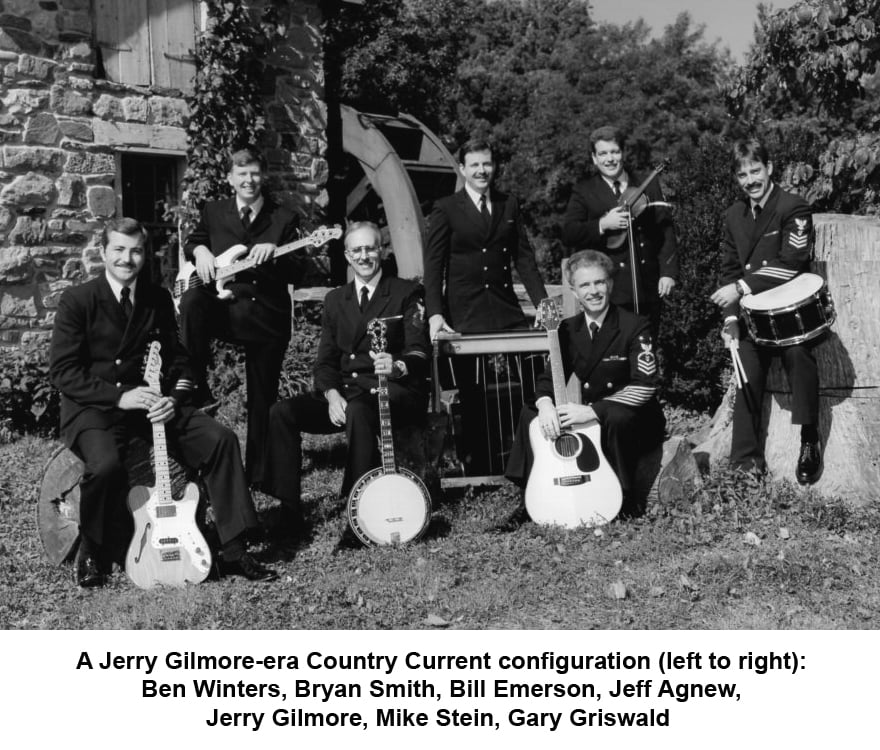
The first fully-manned Country Current group consisted of Eddie Davidson on the acoustic guitar, Bill Emerson on banjo, Bob Faylor on drums, Larry Watts on bass, Bob Kaufmann on fiddle, and Dan Meyers on electric guitar. Although Emerson was coming from a bluegrass background, he understood that the band could not go out to perform at high schools in the mid-west and play Bill Monroe or Flatt and Scruggs music because it would not be relatable. Davidson said, “We’d occasionally play something like ‘Foggy Mountain Breakdown,’ but high schoolers in Fargo didn’t know Lester Flatt from a B-flat. We had to play contemporary country tunes that people were hearing on the radio. We performed at high schools for recruiting purposes and had to make the military look inviting.” During shows in the early days, the band did not wear their Navy uniforms on stage because the military had a bad reputation, so they wanted the band to appear more casual. Davidson said, “They didn’t want us to look like we were in the military.”
Before Emerson joined the band, they had gone out for a couple of tours. Sometimes they would share a show with the Navy’s rock band, Port Authority. In the early days, the band performed at high schools, county and state fairs, and occasionally for various Navy functions. In 1974 they also appeared on the Grand Ole Opry. Davidson remembers that the band performed “One Tin Soldier” on the Opry stage, a song that was popular in the early 1970s, partially due to its use in the 1971 film Billy Jack.
When Emerson joined the band, he brought his experience with him. Davidson said, “We learned a lot more with Bill in the band than we would have ever figured out on our own. Our harmonies got a lot better and he taught us that what you don’t play is just as important as what you do play. He was a master at that.”
Early Country Current Recordings
In 1974 the band recorded its first album, titled Goin’ Country With The Current. The album was produced by The Recruiting Advertising Department of the Navy Recruiting Command and was “not for sale,” but for distribution to field recruiters for “Navy public information and recruiting purposes.”
By the time this album was recorded, the band had added a female vocalist, Tensel Parker. There were fourteen cuts on the album with a mix of country and bluegrass music. Tensel Parker sang “Country Sunshine,” “(I Never Promised You) A Rose Garden,” and “(How Can I) Unlove You.” Eddie Davidson sang Phil Rosenthal’s “Muddy Water,” Tom Paxton’s “The Last Thing On My Mind,” “Cryin’ Holy,” “Lovin’ Her Was Easier,” “Washed My Hands in Muddy Water,” and “West Montana Hannah.” Ben Winter, who replaced Dan Meyers on electric guitar, sang, “Your Cheatin’ Heart.” Instrumental tunes featured were a Bill Emerson tune titled “Navy Blue,” the Buck Owens tune “Buckaroo”—featuring Dan Myers on guitar—plus a couple of tunes that highlighted the fiddle player (Bob Kaufmann)—“Orange Blossom Special,” and “Maiden’s Prayer.”
In 1975, County Current went back into the studio to record a new album titled United States Navy On Its 200th Salutes The Grand Ole Opry On Its 50th. In an email to his son Mike, Emerson said, “We recorded these tracks at the Navy Yard specifically for Navy Recruiting, who used them to promote our tour performances. They are rare and were never for sale.” The eight tracks on this project included “Cripple Creek,” “Paddy On The Turnpike,” “Cryin’ Holy,” “Back Home Again,” “Lovin’ Her Was Easier,” “Oh Boy,” and “Your Cheatin’ Heart.”
Jerry Gilmore Brings Seventeen Years of Navy Experience to the Band
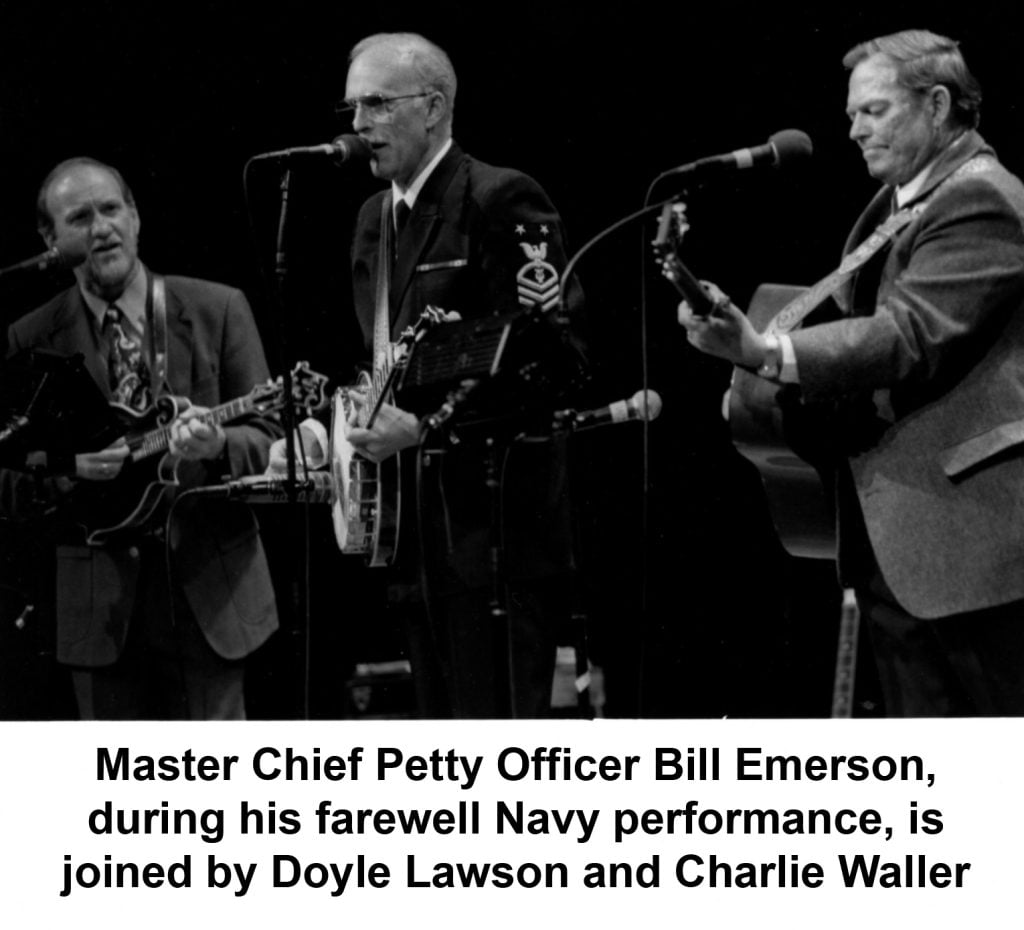
Eddie Davidson stayed in the Navy until 1976. When he left the Navy he moved to Nashville and toured with other Nashville musicians—including three overseas tours with Mark O’Connor—while going to law school. Davidson spent the remainder of his working life litigating catastrophic tort cases. He is now semi-retired and living in Texas.
Davidson was replaced in the Navy band by Jerry Gilmore. Unlike, Davidson and Emerson, who were new to the Navy when they joined the band, Gilmore had already spent nearly eighteen years in the Navy as a communications technician prior to joining Country Current. After winning a talent contest in 1972, while stationed in Germany, Jerry was sent to the Armed Forces School of Music in Little Creek, Virginia. When Jerry completed the music school program there was no opening in Country Current, so Jerry performed in one of the CINCLANT Fleet bands, the Country Helmsman (in Norfolk, Virginia), until a spot in Country Current opened up.
After Jerry joined Country Current, he discovered opportunities for the band to play more shows. In a phone interview conducted with Jerry in December of 2021, he explained that Bill knew the music, but he didn’t know the Navy. Jerry had to learn how to play bluegrass from Bill, but—having spent nearly twenty years in the Navy—Jerry knew how the Navy operated and could teach Bill about working the Navy system. Through Jerry’s experience in navigating the Navy channels, the band was able to start getting a more diverse number of gigs. He said, “We started to play theaters around the Washington, D. C. area. Because of that, I told Bill that we needed to expand our repertoire. We couldn’t play the same set of songs two nights in a row when the venues were within driving distance of each other. So, we started rehearsing and learning new material.” During Gilmore’s time with the band, they also performed at their first country/bluegrass festival, which was located at Whippoorwill Park in Warrenton, Virginia.
In addition to working Navy channels to get the band more gigs, Gilmore also worked to get the band more respect within the Navy music program. He said, “We were the redheaded stepchild of the Navy program. A lot of people in the Navy did not want the country and bluegrass band. They didn’t understand the draw. I started inviting musicians from the concert band, the jazz band, and the choral group to come out and see our show. When they witnessed how the audience responded to us, I think they got it. I also started attending their shows and I brought Bill with me, which helped make a connection and earn us more respect among Navy Band personnel.”
Gilmore was also responsible for Country Current recording their next album. He said, “By 1977 we were performing two shows per day on many occasions. Bill made a comment about how tight the band was getting and said that he wished that we could record. I said, ‘Let’s go into the studio as soon as we get off the road’ and I booked the studio time.”
The Navy had its own recording studio for the purpose of recording promotional music and patriotic songs for use by the Navy. So, finding a recording studio that could record them without a budget was not a problem. However, Emerson did not feel that the Navy would fund making another album of Country Current music. Once again, Gilmore knew the system. He knew that at the end of every year, if funds were remaining from that year’s budget, those funds had to be spent or else the following year’s budget would be reduced. Sure enough, the Navy band had some extra money at the end of the year and approached Country Current asking if the band needed any new instruments. Gilmore told them that they were all happy with their instruments, but they could use some money to put out the album that they had recorded. Thus, Country Current – 78 was released.” In addition to country hits such as “Lucille,” “Daytime Friends,” and “Good Hearted Woman,” the album included bluegrass selections such as “The Old Home Place,” Emerson’s “Cowboys and Indians,” and “Bluegrass Medley.” The “Bluegrass Medley” included “City of New Orleans,” “Fox On The Run,” “Uncle Pen,” and “Roll In My Sweet Baby’s Arms.” The band personnel on this recording were Bill Emerson, Jerry Gilmore, Bob Kaufmann, Pat Verner, Joe Barnes, and Ben Winter.
After Country Current – 78 was recorded, the Navy band added a line item in the budget which allocated funds for the Navy Band to record a new album roughly every two years. Country Current – 78 was followed by We Pick The Navy, recorded in 1979, Changing Current, recorded in 1982, and A Decade of Service, recorded in 1985. Not one of these records were every made available commercially. They were all recorded and distributed for promotional purposes.
Jerry Gilmore stayed in Country Current until he retired from the Navy in 1988 with nearly thirty years of service. During his time with the band, they not only played at high schools, at county and state fairs, at various theaters, at bluegrass festivals, at Opryland, and on the occasional television show, but they also played “high visibility” gigs for the President and Vice President, Congressman, and Senators—especially after President Reagan took office. Jerry said, “President Reagan and Vice President Bush liked a Western motif. President Reagan would hold a Western style barbeque on the south lawn of the white house a couple of times a year and invite Country Current to play, as well as popular country stars of the day such as the Oak Ridge Boys and Tammy Wynette.”
Gilmore recalls a time when Larry Gatlin was supposed to perform at one of the barbeque events, but was unable to make the show. Charlie Daniels happened to be in Washington testifying before Congress about payola and he was invited to fill in for Gatlin. Since Daniels’ did not have his band with him, Country Current backed him up. After Daniels played some tunes solo, Country Current backed him on some of his hits, included “The South is Going to Do It Again,” “The Devil Went Down to Georgia,” and “Amazing Grace.”
Wayne Taylor and More Bluegrass for Country Current
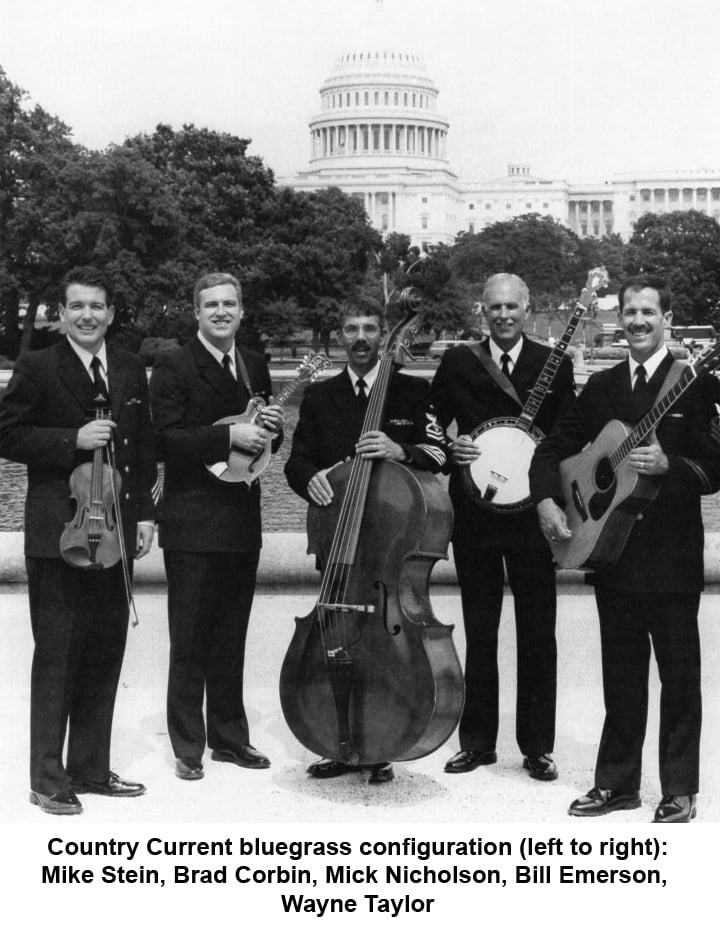
When Jerry Gilmore’s time in the Navy was winding down, the Navy started looking for someone to replace him and Bill Emerson was interested in getting someone with a bluegrass background. Bill had heard a tape of a guy named Wayne Taylor and brought him in for an audition in 1987.
Taylor had grown up playing rock and roll music in high school bands in North Carolina. After he graduated high school, a friend took him to see a bluegrass show, which included Lester Flatt and Mac Wiseman. After seeing that show, the bluegrass bug bit him and by 1972 he was playing mandolin in a bluegrass band called East Maiden Express. Wayne said, “We were big Country Gentlemen fans.” So, although Taylor did not meet Emerson until the 1987 audition, he certainly knew about Bill Emerson.
Taylor stayed with East Maiden Express until he joined the Navy in 1974. For the first two years of his Navy career, Taylor was not in the music program. He was working in aviation maintenance administration. While serving on Midway Island in the North Pacific, Wayne found a Fender Stratocaster and started a country band that played during off-duty hours. Through work with that pick-up band, Wayne met sailors who were in the Navy band and they told him about the Navy’s band program.
Thinking that getting paid by the Navy to play music would be a fun thing to do, Wayne made a tape at a radio station and submitted it up the chain of command. The powers that be felt that the tape was good enough to earn Wayne an audition in Hawaii. His audition went well enough to get him assigned to the Navy School of Music in Little Creek, Virginia.
In 1976 Wayne was assigned to play in The Orient Express, the 7th Fleet’s Navy rock band based in Yokosuka, Japan. In a phone interview conducted in December of 2021, Wayne said, “I knew about Bill Emerson and Country Current and I put in a request to be in that band, but they already had Jerry Gilmore as the lead singer and guitar player.” In 1978 Wayne left the Navy, earned his college degree, got a job as a counselor at a minimum-security prison and started a music therapy program for the inmates. After spending three years at the prison, Wayne got a job as a probation parole officer.
After spending roughly eight years out of the Navy, Wayne was no longer happy working as a parole officer and wanted to go back into the Navy. He called a Navy recruiter and asked what was available. Wayne said, “The stars aligned for me because he called me back and told me that Country Current was looking for a new lead singer. They asked me to send in a tape with just me singing and playing the guitar. I made a tape with six songs on it. After they heard the tape they called me in for a formal audition.” That is when Taylor met Bill Emerson for the first time and Bill brought him into the band. Taylor said, “Bill was the reason I got that gig.”
When Wayne became a member of Country Current, Jerry Gilmore still had a bit more time before he was to retire, so the two overlapped in the band for one tour. During that tour Wayne played mandolin and Jerry stayed on the guitar. Wayne said, “For me, it was very exciting. It was like Christmas every day.”
After Wayne joined the band, Country Current started playing more bluegrass festivals. Wayne recalls, “Bill Emerson took a copy of Bluegrass Unlimited that had festival listings to the people in the Navy Band administration office and said, ‘Can you get us booked at some of these festivals?’ From there, the bluegrass band really took off. We could have played 52 weeks a year.”
By the time Wayne joined the band, bluegrass festivals were in full swing nation-wide. It was great publicity for the Navy to have County Current perform at bluegrass festivals and it was a great deal for the festival promoters because they didn’t have to pay the band to play—the Navy did that. The festival only had to pay for transportation and lodging. It was a win-win situation and bluegrass fans loved hearing Country Current play.
One of the most memorable trips for Wayne Taylor during his time with the band is when they traveled to Beijing, China with the senior President Bush. He said, “President Bush traveled to China in 1989 and wanted to bring us with him. He put on a Texas-style barbeque for the Chinese officials. During dinner we split up into duos and played at various locations around the room. After dinner we got back together and played as a band.” During his time in Country Current, Taylor performed for four presidents—Ronald Reagan, George Bush, Bill Clinton, and George W. Bush. When asked which president was the biggest bluegrass fan, he said it was the elder George Bush.
Joining Up With Old Friends
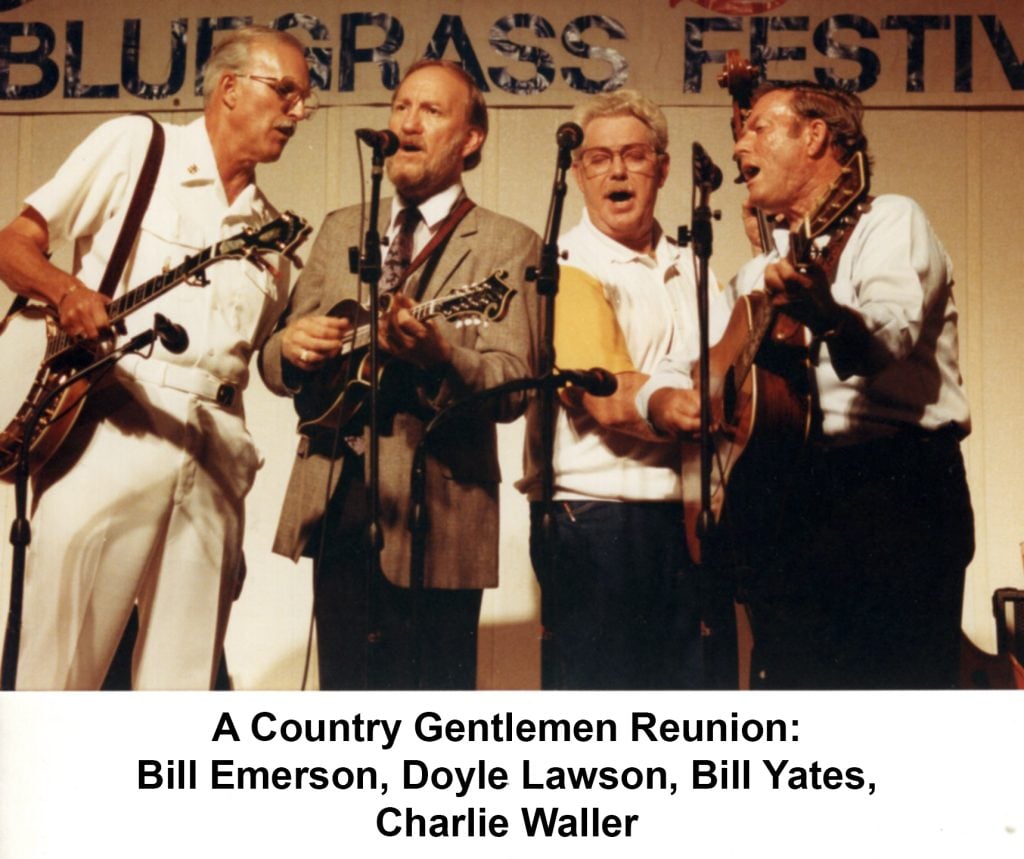
Once Country Current began playing at bluegrass festivals, Bill Emerson was in the company of a lot of old friends and would occasionally join them on stage. In the Bluegrass Unlimited archives, there is a Country Current folder with many photographs of Emerson on stage, wearing his Navy uniform, and performing with bluegrass players such as his old Country Gentlemen bandmates—Doyle Lawson, Charlie Waller, and Bill Yates—J.D. Crowe, and others. In March of 1993 Country Current performed a 20th anniversary show in Fairfax, Virginia. The Emerson-era Country Gentlemen (Waller, Lawson, and Yates) were part of the show and joined Country Current for the finale. This concert also served as Emerson’s farewell performance as a Navy musician.
Wayne Taylor said that Bill liked to tell Jimmy Martin stories while they were traveling and he once took Wayne to Jimmy Martin’s home. Wayne remembers, “I sat there at Jimmy’s kitchen table and Bill and Jimmy sang ‘Little White Church.’ I had the chance to pick with Jimmy and he showed me some rhythm guitar things.”
Taylor also remembers being with Emerson the first time Emerson and his old friend Sonny Osborne had a chance to run across one another after not having seen each other for years. Wayne said, “Sonny looked at Bill and said, ‘You’ve turned into a funny looking old man’ and they both laughed.” Wayne also remembers Sonny Osborne saying, “We can follow anyone in bluegrass, but we can’t follow the Navy band.” He added, “Sonny had respect for the band.”
Bill Emerson Retired from the Navy
In 1993, after twenty years performing as a member of the US Navy band Country Current, Bill Emerson retired from the Navy. As mentioned above, his farewell concert was performed in Fairfax,Virginia, in March of 1993 and included a Country Gentlemen reunion of Charlie Waller, Bill Emerson, Doyle Lawson, and Bill Yates.
After he retired from the Navy, Emerson continued to record and perform bluegrass music. His post-Navy activities will be documented in a future article. However, before we address Emerson’s musical life after the Navy, the next article in this series will present information about Bill’s musical life outside of Country Current while he was still in the Navy.
In addition to performing and recording with the Navy band between 1973 and 1993, Bill was asked to play on many albums being cut by various bluegrass artists, and he also cut a few albums under his own name. Additionally, he and his son, John, were involved with Webco Records. Bill’s activities outside of the Navy during the years 1973 to 1993 will be the topic of the next article.
Share this article
3 Comments
Leave a Comment Cancel Reply
This site uses Akismet to reduce spam. Learn how your comment data is processed.
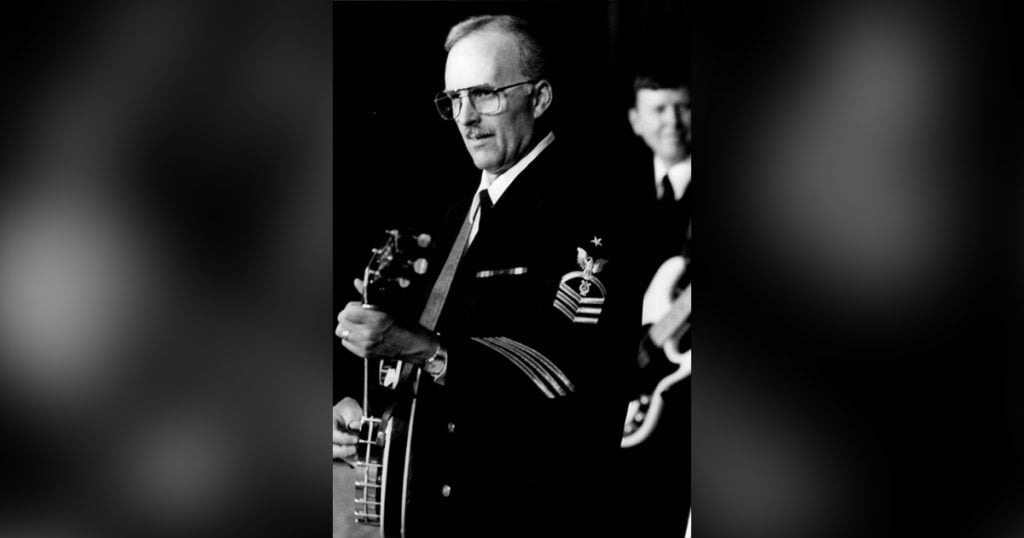
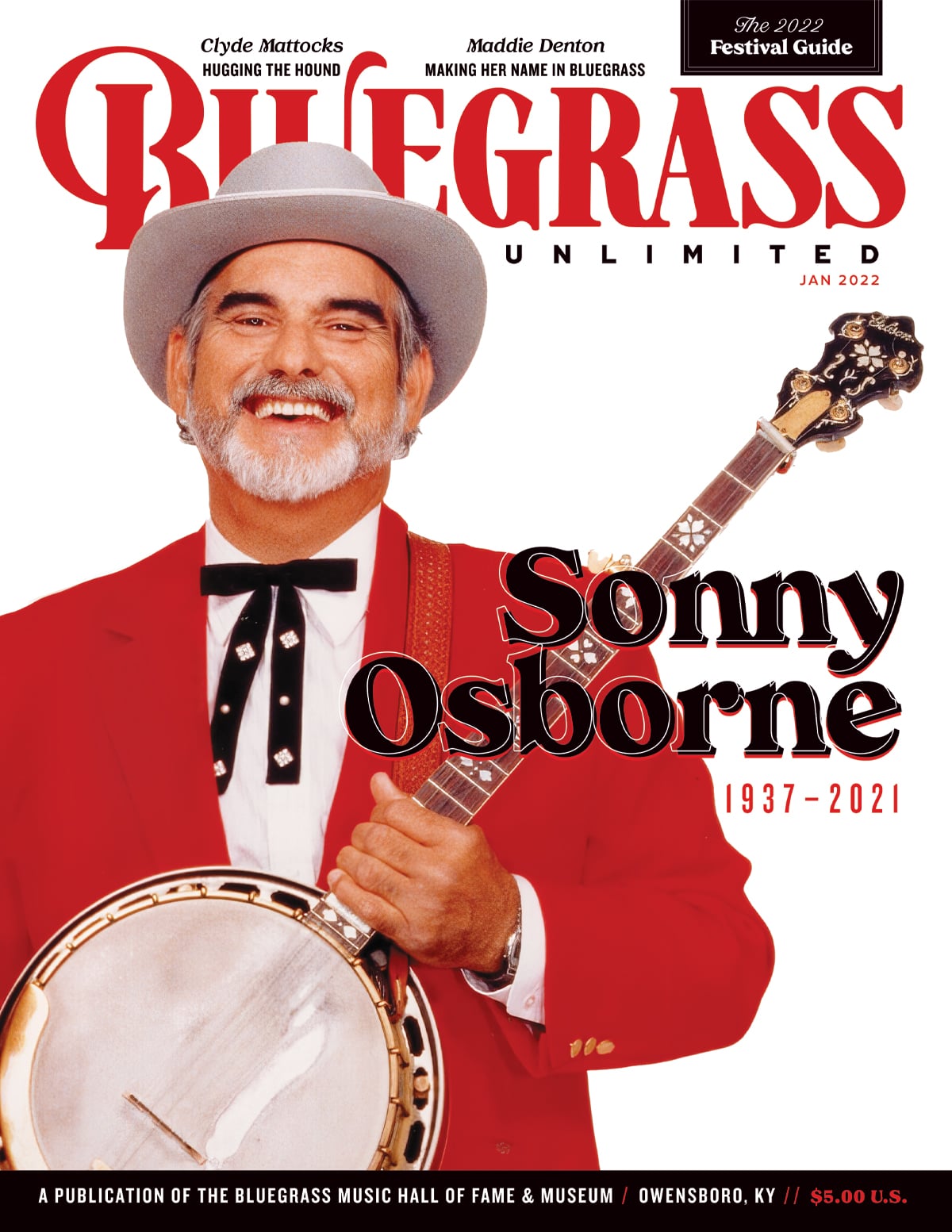
I saw the country current in the early 90s…….man what a show!
I well remember when the Country Current played at a Thousand Islands Bluegrass Festival. As was often the case, the storms came and it was mud-city all over the festival grounds. Some campers required a tractor to pull them out. On Sunday, the Current came on stage in their dress whites. There was not one spot of mud anywhere on them – amazing. Good music too.
Excellent article. I learned a more of Bill’s history than when I was his booking agent when he started the “Bill Emerson and Sweet Dixie” band. I met Bill at a festival soon after he retired from the Navy and we became friends. He called me out of the blue and even though I hadn’t done anything like it in the past, he asked me to be his agent. He said he only wanted 25 gigs a year and not travel over 250 miles. In the fourth year we had 40 gigs and traveled to Utah for a festival. A dear friend and sorely missed